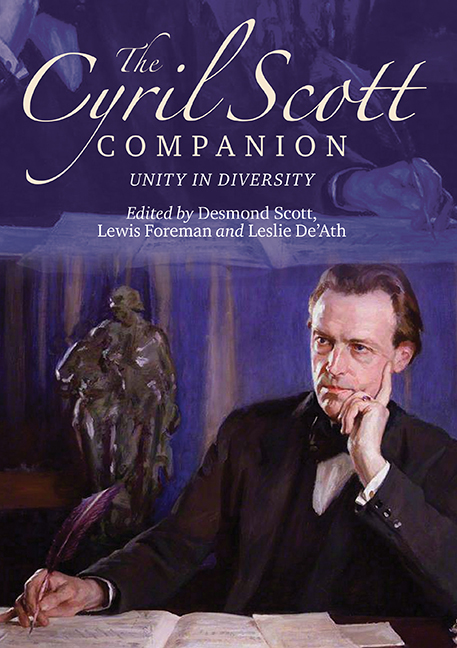Book contents
- Frontmatter
- Dedication
- Contents
- List of Illustrations
- List of Tables
- List of Contributors
- Foreword
- Preface
- Acknowledgements
- Editors' Note
- I SCOTT IN CONTEXT
- 1 From Frankfurt with Love: Friendships Observed through Correspondence and Reminiscence
- 2 Cyril Scott, Debussy and Stravinsky
- 3 Cyril Scott and the BBC
- 4 A Contemporary Composer's View of Cyril Scott's Music: ‘The Subtle Composer of the Prize-Winning Overture’
- 5 ‘Music for the Martians’: Scott's Reception and Reputation at Home and Abroad
- 6 Rose Allatini: Theme and Variations
- 7 Memories of the Man I Barely Knew
- II THE MUSIC
- III THE WRITINGS
- IV PERSONAL REMINISCENCES
- APPENDICES
- CATALOGUES, DISCOGRAPHY AND BIBLIOGRAPHY
- Index of Works
- General Index
6 - Rose Allatini: Theme and Variations
from I - SCOTT IN CONTEXT
Published online by Cambridge University Press: 14 September 2019
- Frontmatter
- Dedication
- Contents
- List of Illustrations
- List of Tables
- List of Contributors
- Foreword
- Preface
- Acknowledgements
- Editors' Note
- I SCOTT IN CONTEXT
- 1 From Frankfurt with Love: Friendships Observed through Correspondence and Reminiscence
- 2 Cyril Scott, Debussy and Stravinsky
- 3 Cyril Scott and the BBC
- 4 A Contemporary Composer's View of Cyril Scott's Music: ‘The Subtle Composer of the Prize-Winning Overture’
- 5 ‘Music for the Martians’: Scott's Reception and Reputation at Home and Abroad
- 6 Rose Allatini: Theme and Variations
- 7 Memories of the Man I Barely Knew
- II THE MUSIC
- III THE WRITINGS
- IV PERSONAL REMINISCENCES
- APPENDICES
- CATALOGUES, DISCOGRAPHY AND BIBLIOGRAPHY
- Index of Works
- General Index
Summary
IN 1921, when Rose Allatini married Cyril Scott, she was awaiting publication of her sixth novel, When I was a Queen in Babylon and he had just returned from a successful tour of the US and Canada.
A very talented woman in her own right, Rose produced forty novels, publishing the last one at age eighty-eight and jotting down notes for yet another, before dying two months short of her ninety-first birthday.
Rose Laure Allatini was born on 23 January 1890 in Vienna, at number 8 Plösselgasse, to a wealthy, cultured Jewish family. Her father, Roberto Allatini, was Italian-Greek, born and raised in Salonika. Her mother, Bronislava (Bronia) Rapoport von Porada, was Austro-Polish, the family originally coming from Warsaw.
In 1895, when Roberto Allatini was posted to the Italian embassy in London, the family found a house at 18 Holland Park, an elegant and secluded street. This was a world away from the busy thoroughfare of Holland Park Avenue, where Rose was to live later, after her marriage to Cyril broke up at the beginning of World War 2.
Her happiest times as a young girl were visits to her glamorous, sophisticated relatives in Vienna, and her memories of that romantic city before 1914 remained embedded deep in her consciousness, and featured in several of her novels.
Love and romance are important in her work, but to consider her merely as a romantic novelist is seriously to misread her writings. Though the tone is often comic, Rose had a serious purpose. Unusually among fiction writers, the spiritual was as important to her as the temporal. Her skill as a writer of fiction enabled her to engage readers with an engrossing tale while also discussing, questioning and illustrating what mattered to her in ways a formal essay never could.
Reincarnation, including karma, was central to her beliefs and a major factor in bringing her together with Cyril Scott. It would be interesting to know what led her in that direction – certainly it was not her very conventional parents. Whatever the reason, from her second novel on reincarnation became a dominant theme in very many of her books, especially as it related to the problem of healing. She was plagued with ill health all her life, so it was of more than academic interest for her.
- Type
- Chapter
- Information
- The Cyril Scott CompanionUnity in Diversity, pp. 89 - 100Publisher: Boydell & BrewerPrint publication year: 2018

